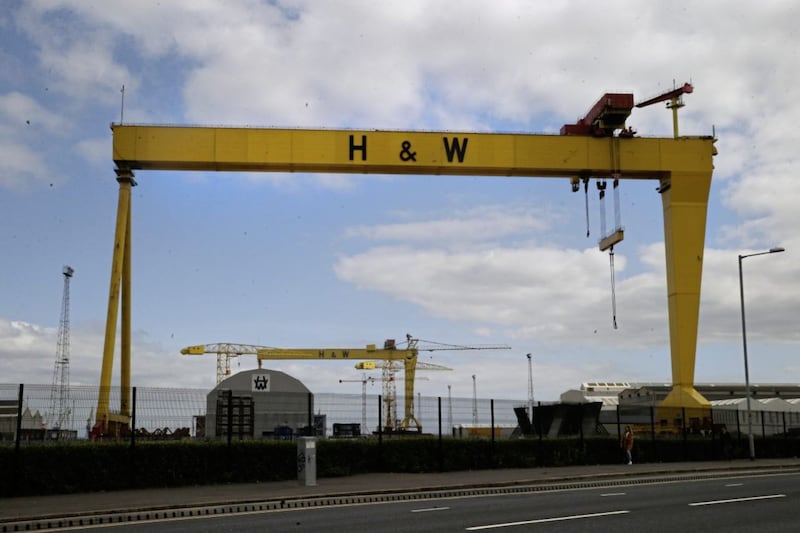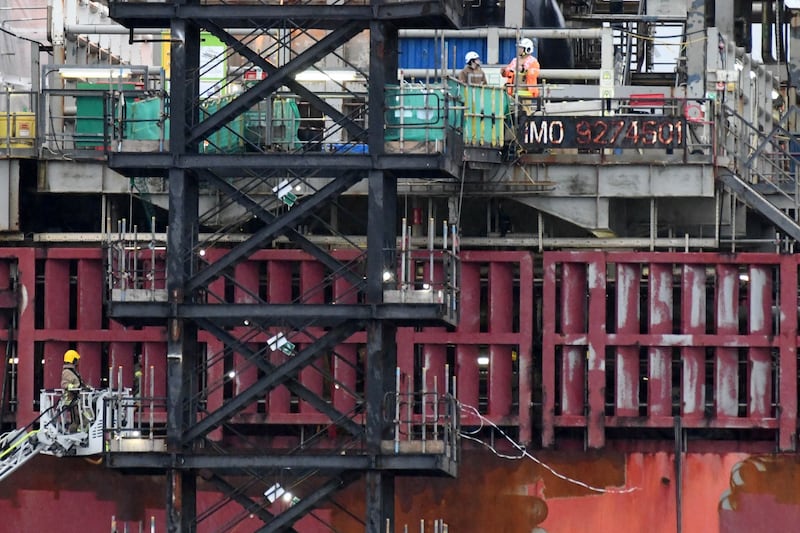IN east Belfast, which I have been proud to represent for 34 years, those two great yellow giants Samson and Goliath still stand tall. They are poignant symbols of Belfast given it was the harbour and its shipbuilders that helped first put Belfast on the map.
As a member of Belfast City Council, I served as a Harbour Commissioner for some time. I was impressed by the wide range of skills around the boardroom and quickly came to understand the long-term planning that went into the success of the Harbour and its significant value to the Northern Irish economy.
Recently, Belfast Harbour Commissioners renewed their £254 million vision for the future. Samson and Goliath, along with the Titanic museum, are to form the basis for an iconic contemporary waterfront, to rival the likes of Liverpool and Blackpool. This waterfront project will be part of multiple interlinked developments which the Commissioners envisage will make Belfast a world leading regional port once again.
Our wonderful city has deep roots as a global trading hub. Past press coverage confirms the harbour celebrated reaching profits of £1.1 million. Trade had at this point peaked at 7.1 million tonnes a year. In comparison last year, the port made a profit of £36 million with 24 million tonnes of trade. The importance of the port to our shared economic prosperity cannot be overestimated and deserves to be more widely acknowledged.
Some 70 per cent of Northern Ireland’s total trade is with mainland Britain, the majority of this flowing through the gateway of Belfast Harbour. This high volume has been sustained for more than 40 years, but changes to Northern Ireland’s customs and trading position are on the horizon.
Despite previous commitments by the Conservative government to unfettered trade access to Great Britain, it's now possible that some form of checks for goods leaving or entering Belfast Harbour could be implemented.
Joe O’Neil, chief executive of the Harbour Commissioners, has said that “while uncertainty remains rife around the final Brexit arrangement, the harbour remains confident it can meet any requirements placed upon it.”
I hope that the government will finalise these trade arrangements as soon as possible, reinforcing the trade links between NI and GB and so enabling local businesses to plan for a positive future.
To realise their vision of Northern Ireland as a global frontrunner in modern port enterprises, the Harbour Commissioners plan to invest £100 million in infrastructure. This will include facilities for an additional Stena Line service to Birkenhead, automated cranes and digitalised shipping lanes. The harbour aims to digitalise, decarbonise and decentralise to develop the port into a leaner, greener and more efficient mechanism for business.
Seeking to build on the accomplishments of Titanic Quarter, the plans will see £30 million spent on real estate and £60 million on five-star office space. This regeneration will feature a 250-apartment City Quays building and a five-storey facility for Catalyst Inc. Addressing the need for social responsibility, the Commissioners will ensure 20 to 25 per cent of the residential accommodation is allocated to social housing.
Given the recent success of Game of Thrones and the wider local film industry, six additional filming studios are to be added to the current pair already in use. These new studios will allow for up to 800 additional jobs in the sector.
These exciting developments are made possible through the Harbour’s Trust Port status, which ensures that profits are reinvested into the Harbour. The success of the Port is crucial to the fulfilment of these developmental projects.
Research from Ulster University estimates the Harbour currently supports 46,000 jobs. These additional investments are expected to generate 7,000 new employment opportunities and support a further 3,500 construction jobs. This could add £500 million in gross value to Northern Ireland’s economy. On top of this, the extra jobs and buildings will account for £300 million in wages and £4 million in rates being paid into the city per annum. A welcome boost to the local and wider economy status.

Many of my generation hold a fondness for the days of shipbuilding. For working class communities, it was often shipbuilding that put bread on the table. It is understandable then, that with a dynamic market-orientated economy, some people may feel that these jobs were never fully replaced, and communities left behind. It is important to remember our past fondly but also to look to potential future growth and fresh opportunities.
The Harbour aims to be “A Port for Everyone” and seeks to invest in people as well as property. Working in partnership with the Prince’s Trust and the Active Communities Network, the harbour is one of Northern Ireland’s largest investors in employability skills and community building initiatives. It funds several school programs including the Time-to-Code initiative, a three-year programme for 5000 students to develop in-demand coding skills.
Money also goes to help more disadvantaged communities through local social programs such as the EastSide Partnership. The funding of similar schemes across Belfast remains a priority for the Harbour Commissioners. This includes popular arts events such as Culture Night, the Belfast Maritime Festival and numerous other local community festivals. The Commissioners recognise the importance of environmental stewardship by supporting initiatives to clean and maintain the natural habitats of Belfast Lough.
History records the harbour’s long economic and logistical achievements. For 400 years it has served us as a gateway to Great Britain and beyond. By looking positively forward, the Harbour Commissioners are actively building upon their rich heritage. In the last two decades, the harbour has evolved from the traditional shipbuilding port by diversifying into the arts and other emerging markets.
These exciting plans will only help Northern Ireland to grow and thrive. Our trade links to GB are vital as the lifeblood of our economy. An investment in the resilient and strongly beating heart of Belfast is a solid investment in us all.
Robin Newton is a DUP MLA for East Belfast and a former Assembly Speaker








